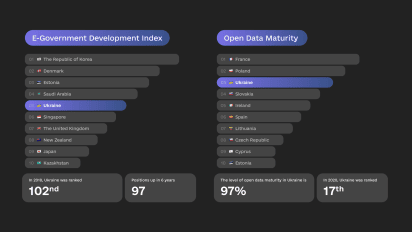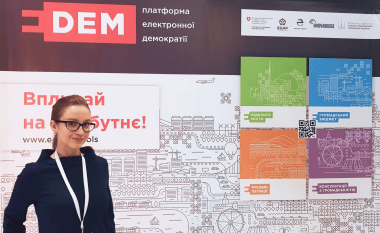- Direction:
- GovTech
Ukraine’s GovTech Topping Global Rankings
- Publication date and time:
- Reading time:
- 9 min

In today’s digital world, where the latest technological changes actively influence public life, including the functioning of the state and its interaction with citizens, the issue of implementing e-democracy is becoming increasingly relevant.
Electronic democracy (e-democracy) is a form of social relations in which citizens and organizations use information and communication technologies to participate in state-building, public administration and local self-government.
E-democracy allows to
- increase the participation, initiative and involvement of citizens in public life at the national, regional and local levels;
- improve the transparency of the democratic decision-making process, as well as the accountability of democratic institutions
- improve the responsiveness/response of public authorities to citizens' appeals.
E-democracy is based on the principles of transparency, openness, participation and public education. E-democracy aims to increase citizen participation in government and decision-making through electronic technologies.
E-democracy opens up new channels for citizens to receive current information about the political situation in the country and their accountability to civil society.
It reflects the ability of everyone to participate in the formation and implementation of state policy, solving issues of local importance, and decision-making by the authorities while using information technology for two-way interactive communication between the state (authorities) and citizens.
Ukraine’s position in global digital governance rankings is relatively high. According to the results of the UN E-Governance Survey — Accelerating Digital Transformation for Sustainable Development, in 2024, Ukraine became the first in the E-Participation Index. In 2014, it ranked 77th out of 193, and in 2022, it ranked 57th out of 193. The E-Government Development Index ranked Ukraine 30th, up 16 positions from 2022.
Ukraine in UN E-Participation Index 2024 | Ukraine in UN E-Government Development Index 2024 |
1st out of 193 countries | 30th out of 193 countries |

The basic tools of e-democracy in Ukraine are e-appeals, e-petitions, e-consultations, e-surveys, e-voting, open data portals, participatory public budgets etc.
The creation of the legislative framework for e-democracy in Ukraine began in 2002 when Ukraine’s Cabinet of Ministers adopted a resolution «On the Procedure for Publication of Information on the Activities of Executive Authorities on the Internet.» In 2007, the Law of Ukraine, «On the Basic Principles of Information Society Development in Ukraine for 2007-2015, ” was adopted. In 2013, the Cabinet of Ministers of Ukraine approved the Strategy for the Development of Information Society in Ukraine, but not all of its goals were fully achieved.
In 2015, the government developed a Roadmap for the Development of Electronic Democracy. Electronic petitions became the first significant tool of e-democracy in Ukraine. To introduce them, the Law of Ukraine «On Citizens' Appeals» was amended in 2015 to formalize the mechanism of electronic collective appeals of citizens to the President of Ukraine, the Verkhovna Rada, the Cabinet of Ministers and local governments.
The Presidential Administration of Ukraine was the first government agency in Ukraine to introduce an electronic petition service. Subsequently, other institutions opened pages for submitting electronic petitions. Today, e-petitions have been introduced at all levels of government. During the first year of the tool’s operation, 2 million Ukrainians supported at least one petition to the President. The petition needs 25 thousand signatures within 3 months to be considered by the President. In 2023, there was a record number of petitions supported by citizens — 1196, while from 2015 to 2023, there were less than half a thousand such petitions. During the first half of 2024, almost half of the e-petitions submitted to the President of Ukraine received the required 25 thousand votes (1391 out of 2827). Nearly half of all petitions in 2023 and 2024 and 70% of petitions that received the required 25 thousand votes were on «Awarding and conferring honorary titles.» A significant number of such petitions concern posthumous awards.
Number of signatures needed for the petition to be considered by the President | Number of Ukrainians who supported at least one petition to the President |
25 000 | ~ 2 000 000 |

In 2017, the government developed and approved the Concept and the Action Plan for the Development of Electronic Democracy in Ukraine for 2019-2020. The document provided for drafting a law on electronic voting, introducing electronic voting into the activities of student self-government bodies, developing participatory budgeting at the regional and local levels, implementing the all-Ukrainian public budget initiative etc. The websites of central and local government authorities play an essential role in informing the public about the authorities' activities, facilitating citizens' access to open data, public services and opportunities to influence them through e-applications and e-petitions. The website of the Verkhovna Rada of Ukraine publishes legislative acts after their adoption. Moreover, the local self-government body websites include e-receptions of citizens.
The Unified State Register of Court Decisions and the eCourt app represents the judiciary online. The first one has more than 123 million documents in its system. The eCourt app allows users to receive push notifications through an electronic cabinet and view proceedings, procedural documents and petitions. «eCourt was developed by the State Judicial Administration of Ukraine and the Center for Court Services under the United Nations Recovery and Peacebuilding Program with financial support from the European Union.
According to the statistics of the Government Contact Center of the CMU, in 2024, 1 million 781 thousand 431 e-appeals were received from citizens, of which 661 thousand 717 were sent to executive authorities, and the remaining 1 million 119 thousand 714 were explained to the applicants.
Number of e-appeals to the Government Contact Center of the CMU in 2024 | Number of e-appeals by type of action |
1 781 431 | 661 717 sent to executive authorities |
1 119 714 explained to the applicants |
Since 2022, polls in the Diia app have become a critical e-democracy tool. Among the most important and popular were polls on the date of the Christmas celebration (1.5 million Ukrainians voted), the attitude of Ukrainians to gun ownership (1.7 million Ukrainians voted), the preservation or abolition of the March 8 holiday (2.1 million Ukrainians voted), and others.
The most commonly used e-democracy tools at the local level are open data, including open budgets, e-consultations, online public hearings, e-voting, contact centers, participatory budgets or online public budgets and electronic petitions. These tools are provided mainly by local council websites and several local specialized services, such as the Kyiv Contact Center, the City Panel of the Lviv City Council, the virtual mayor’s reception in Ivano-Frankivsk and the Twenty-Four-Hour Watch in Vinnytsia. The Kyiv City Council’s e-petition portal is also popular. For a petition to be considered on the portal, 10,000 signatures must be collected within 90 days. Local communities can also access free tools and platforms like the Unified System of Local Petitions and Smart City.

An important role at the local government level is played by the Single Platform for Local Electronic Democracy (E-DEM). This portal allows the community to implement e-democracy tools and increase openness and transparency. The Open City portal operates on this web platform, which has resolved 31668 citizen appeals as of March 13, 2024. Another popular platform tool is the Local Petitions portal, which has been used to submit 25572 petitions. Other tools such as Public Consultations (3713 held) and Public Budget (2150 projects supported) are also actively used. The platform was created within the framework of the Swiss-Ukrainian program «E-Governance for Government Accountability and Public Participation» (EGAP), implemented by the Eastern Europe Foundation in partnership with the Ministry of Digital Transformation of Ukraine and funded by Switzerland.
Open City portal results | Local Petitions portal results |
31668 citizen appeals resolved | 25572 petitions submitted |
Public Consultations platform results | Public Budget platform results |
3713 consultations held | 2150 projects supported |
Participatory budgets are an important tool of e-democracy. It allows citizens to determine what needs to be addressed by budget funds. Citizens' proposals are considered, and part of the city budget is allocated to projects chosen by the community, which are selected by electronic voting. In 2016, Kyiv revolutionized participatory budgeting: residents voted for projects exclusively electronically, essentially the first «electronic elections» in Ukraine. As a result, 62 projects were selected, and 50 million UAH were allocated for their implementation. In 2024, the public budget of the city of Kyiv already amounted to UAH 250 million.
Participatory budgets are being implemented in Ukraine, even in schools. Students, teachers, parents and school administrators collaborate to prioritize and implement projects to improve learning conditions and develop the school community. Through the E-DEM platform, 305 schools have already been connected to the program, and 1178 projects have been submitted, 307 of which have been funded for a total of UAH 23.9 million, mostly from local budgets.
Participatory budgets — schools connected | Participatory budgets — projects submitted |
305 | 1178 |
Participatory budgets — projects funded | Participatory budgets — total funding for schools |
307 | UAH 23.9 million |
In 2016, Ukraine also introduced e-declarations. Since then, high-ranking officials have been required to declare their finances and property electronically annually. The submitted declarations are available online, ensuring public scrutiny of civil servants' and politicians' wealth.
Open data portals make it easier for citizens to access public information. Special software processes large amounts of information to work with open data. Artificial intelligence is gradually being introduced into these portals. OpenDataBot occupies an essential place among the portals for working with open data. Another innovative achievement was opening the Unified State Open Data Web Portal in 2015, which created an opportunity to work with the public authorities' open data—subsequently, the Open Data Competence Center, Diia.Open Data was launched, which became an aggregator of all public open data in the country, to increase the level of knowledge about open data, its impact, and benefits for everyone and assist Ukraine in becoming one of the most transparent countries in the world. Despite the ongoing war, Diia.Open Data provides access to an extensive repository of more than 36,000 datasets and actively cooperates with 11,000 public data providers for up to 9,000,000 users, reinforcing transparency and innovation in the public sector.

The Ministry of Digital Transformation also systematically develops local e-democracy through the Diia.Digital Hromada platform, a national web portal for digital leaders. The project’s main goal is to digitalize Ukraine’s regions, but introducing e-democracy is integral to this agenda. The platform also compiles the Index of Digital Transformation of Regions, provides contacts of digital leaders of communities and regions, recommendations for implementing digital transformation projects, and a knowledge base.
Among the problems with the development of e-democracy in Ukraine is a significant inequality in Internet use among citizens. For example, people without smartphones and Internet access cannot vote in an online city council survey, so their opinions will not be considered. A digital divide is emerging, where less affluent or older people may be excluded from decision-making.
The advantages of e-democracy are apparent. These include transparency and reduced risks of corruption, activation and involvement of citizens in decision-making, strengthening of citizens' trust in the state, reduction of costs for democratic procedures, and reduction of the expenses for interactive engagement with citizens. However, a potential threat is the vulnerability of e-democracy tools to cyberattacks, mainly because russia attacks Ukrainian official websites of authorities. There is also a high likelihood of manipulating public opinion, which can be done with the help of modern information and communication technologies.

Despite these challenges, the potential benefits of e-democracy far outweigh the risks. By strengthening cybersecurity measures, promoting digital literacy, and ensuring transparency, e-democracy can become a more resilient and secure platform for citizen engagement. If these safeguards are effectively implemented, the system can continue to enhance democracy, empower citizens, and build trust between the state and the people. E-democracy is a tool of progress, and with thoughtful implementation and ongoing improvement, it can transform governance for the better, fostering a more inclusive, informed and active society.
The article was prepared by the Kyiv Global Government Technology Centre Team. The Centre is supported by the World Economic Forum, the Ministry of Digital Transformation of Ukraine, and Switzerland under EGAP Program, implemented by East Europe Foundation.


